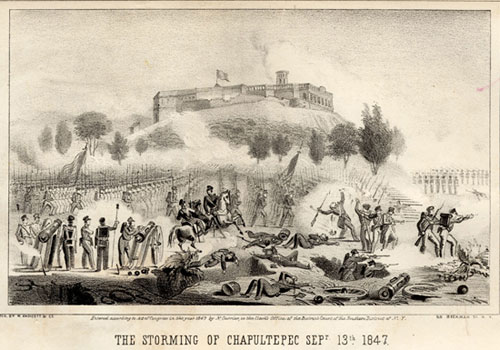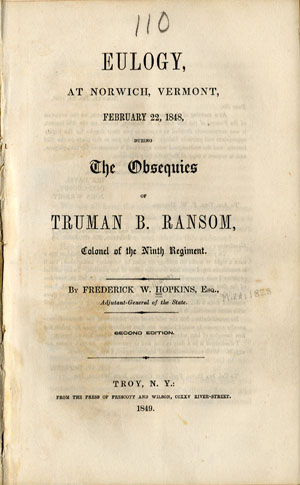
|
Vermont
and the Mexican War, 1846-1848 |
|
|
|
|
| Waged
on the disputed border between Mexico and the recently annexed
territory of Texas, the Mexican War was remote from the everyday
lives of most Vermonters. Indeed, Vermont contributed only one
company of volunteers to the war. While few in number, the members
of that company participated in dramatic battles, and a significant
number were killed or injured. Vermonters who served in the Mexican
War encountered an unfamiliar and generally inhospitable environment.
While soldiers withstood the travails of war, most Vermonters
confronted altogether different challenges: commercialization,
unfavorable changes in the farm economy, and demographic flux
as native-born Vermonters left the state and French-Canadian and
Irish immigrants entered to fill jobs in the industrializing economy.
Popular partisan spectacles characterized state and national politics,
and slavery was a central political issue.1
The Mexican War, which abolitionists perceived as an effort to
extend and fortify the practice of slavery, inflamed antislavery
feelings in Vermont and throughout the Northern United States,
as speeches by members of Vermont's congressional delegation reveal.
Like the larger community, Middlebury College was relatively unaffected
by the Mexican War. The question of slavery certainly engaged
students and faculty, but financial adversity, diminishing enrollments,
and responsibilities to struggling families and communities back
home weighed more heavily on the hearts and minds of Middlebury
undergraduates.2 |
|
 |
Members of Vermont's Congressional Delegation Speak against the War |
|
Eulogy for Colonel Truman B. Ransom, Who Fought and Died in the War |
 |
this website is copyright Middlebury
College, 2004
images and documens are copyright as noted
no part of this website may be reproduced without permission

